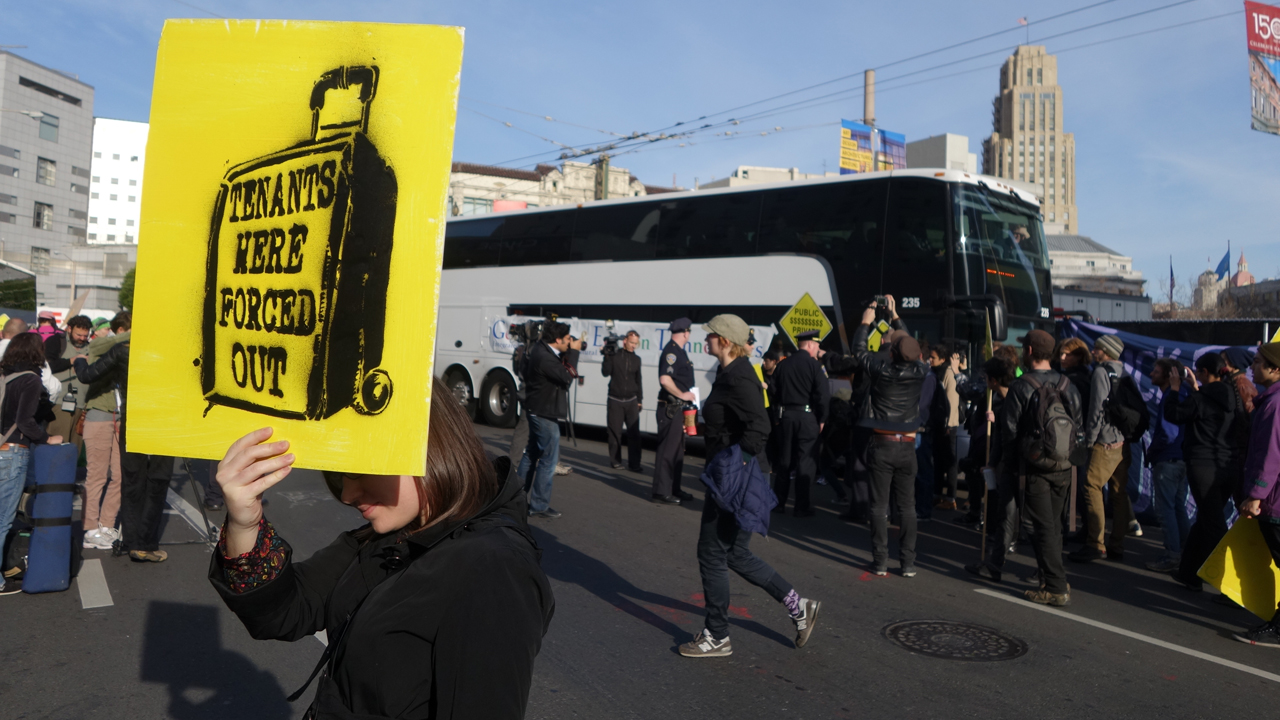
On Tuesday the San Francisco Board of Supervisors, an 11-member outfit that runs the city, sat through a marathon, eight-hour hearing in a high-ceilinged room at City Hall. The central issue of that hearing—an appeal for an environmental review of a transportation pilot program—was soporific on the surface. But the pilot program at issue was the city’s regulation of private shuttles, known colloquially as “Google buses,” and discussions of air quality quickly gave way to heated arguments about class warfare.
Citizens have long been complaining about private shuttles that use public bus stops without paying or being ticketed, particularly the imposing, double-decker coaches that pick up tech workers in San Francisco and ferry them to jobs at big tech firms in Silicon Valley. For angry citizens whose public buses might be blocked or delayed by these vehicles, the private shuttles have become symbols of a two-tiered system in San Francisco—one in which the wealthy are given breaks and the poor are displaced. “I have a problem with the arrogance of tech companies who have captured our bus stops,” said a union worker who spoke during the hours of public comments on Tuesday. “You’re going to make cuts to programs for the poorest families in this city, and these Google people stroll in and out like they’re royalty. And I’m sick of it.”
Among the dozens who took turns in front of the microphone—some leveling disrespectful epithets at the supervisors, others giving sarcastic speeches, and many trying to find a middle ground—were some “Google people” and other tech workers who are often lumped into a stereotyped “them” by residents angry about changes Silicon Valley wealth is spurring in the city. “I don’t know how this has become an engineering or tech issue,” said an engineer, noting that many of his colleagues have lived in the city for decades. “Let’s talk about affordability, transportation. I would love to talk about all those things, but how about [people critical of tech workers] first admit that we are part of the local community as well. Until then, they can take their Tea Party tactics and go bully another minority … We pay atrocious rents just like you do.”
In an attempt to appease the public, the San Francisco Municipal Transportation Authority recently presented a plan to start regulating the private shuttles, charging them $1 per stop to recoup their costs. (A state law limits them from charging more than their outlays for this type of program.) The pilot program, set to start this summer, was exempted from being given an environmental review but labor unions and community groups appealed that decision, arguing that the environmental impact of the shuttles—from noise pollution to the displacement effect of increasing the value of apartments near the stops—must be calculated. The city’s transit authority and planning department countered that the project isn’t introducing a fleet of shuttles; it’s gathering data on how the city might regulate shuttles that are already operating, and that regulation has negligible environmental impact.
While some supervisors quizzed city attorneys and transportation officials even-handedly, trying to work out all the legal nuances of the state law and case law, others came to the meeting with a clear line of questioning in mind. Supervisor Scott Wiener engaged in a heated back and forth with the lawyer arguing in favor of the environmental review, Richard Drury, pointing out that of the private shuttles currently operating, an estimated 80% transport riders within the city, to schools and hospitals as well as tech firms, while only 20% take riders out of town—yet their case focuses only on those 20%.
“It’s your position that it’s only the fact that tech workers are living here that is causing gentrification and it’s only the tech shuttles that are causing the noise, bike, pedestrian and cancer problems. I don’t understand that,” Wiener said, suggesting that the appeal wasn’t really about environmental issues. Drury argued that physical differences in the shuttles, like their size, and the way they use streets partly account for their focus on that 20%. Wiener also emphasized how many cars the shuttles keep off the road, before more tech workers testified to their dependence on the shuttles during public comments.
Other supervisors threw Drury softballs so he could expand on the potential damages of the “pirate private shuttles.” But as the matter came to a vote, many supervisors emphasized that the decision before them was about the environmental impact study alone, not about whether they liked the pilot program and even less about how they felt about private shuttles in general. With one supervisor absent by the time the vote finally took place around 10:30 p.m., the appeal failed 8-2, meaning the pilot program can go forward as planned.
Right before the vote, Supervisor Jane Kim—who voted against the appeal—explained that she had many doubts about the pilot program and suggested another path of recourse might have a greater impact. “It may be,” she said, “that this is an issue that is more appropriate for the ballot.” And with the appeal lost, critics of the private shuttle program are likely giving that avenue a closer look.
More Must-Reads from TIME
- Why Trump’s Message Worked on Latino Men
- What Trump’s Win Could Mean for Housing
- The 100 Must-Read Books of 2024
- Sleep Doctors Share the 1 Tip That’s Changed Their Lives
- Column: Let’s Bring Back Romance
- What It’s Like to Have Long COVID As a Kid
- FX’s Say Nothing Is the Must-Watch Political Thriller of 2024
- Merle Bombardieri Is Helping People Make the Baby Decision
Contact us at letters@time.com